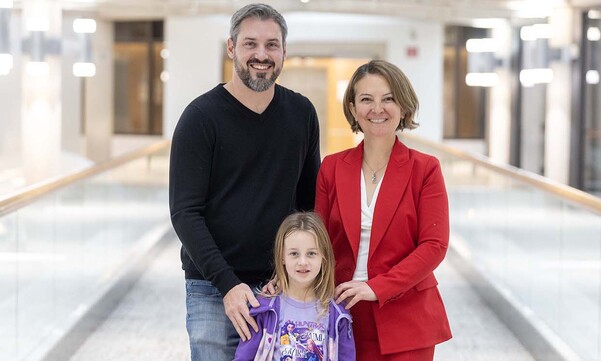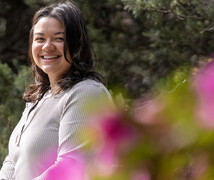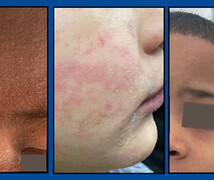U.S. Air Force veteran Michael Bonnette and his brother Robert, a volunteer firefighter, are used to saving the lives of others. After developing pulmonary fibrosis, they turned to Duke University Hospital for double lung transplants because of its short wait times and pulmonary rehab program. Now, a few years later, the brothers are back to their active lifestyles.
From Picture of Health to Needing a Lung Transplant
The Bonnettes, two of 11 siblings, were both in excellent physical shape and enjoyed running, weightlifting, and other athletic pursuits when they began experiencing breathing difficulties -- Michael in the late 1990s, and Robert around 2010.
Michael, a pilot, was exposed to toxic gases during an explosion that occurred during his deployment to the Middle East for the first Gulf War, in 1991. Though he sustained some burns on his hands, he showed no signs of respiratory distress. During a routine health screening about a month later, however, a scan revealed slight scarring in both lungs. Doctors said they would monitor him.
It wasn’t until about 1999 that Michael -- by this time retired from the military and a pilot for American Airlines -- began to experience shortness of breath. He underwent an open-lung biopsy, which revealed that he had pulmonary fibrosis, a disease in which lung tissue becomes scarred. There is no cure for the condition, and doctors told Michael he likely would need a lung transplant within the next decade.
“To me, it was a death warrant,” said Michael, 61, of Haddonfield, NJ. “I was going downhill fast.”
Short Wait List for Lung Transplant Leads Michael to Duke
By 2009, Michael had difficulty breathing and was on oxygen to sleep. He needed a lung transplant and was placed on the waiting list at two hospitals in the Northeast. His nephew Eric, who hoped to donate a portion of his lung to Michael, learned about Duke as he researched transplant centers. Eric discovered that the wait time for donor lungs at Duke was much shorter than the national average.
At Eric’s urging, Michael called Duke. Impressed with the friendly staff and quality of the program, Michael pursued transplant listing at Duke. He and his then-girlfriend packed up their cars and prepared for an extended stay in Durham. They drove through a blizzard to make it to his initial appointment in winter 2010. He was placed on Duke’s transplant list and underwent a bilateral lung transplant just a few weeks later.
“My experience at Duke was spectacular from day one,” said Michael, who spent about three months in Durham before, during and after his transplant. “The hospital staff exuded Southern hospitality; everybody was equally professional and friendly. They bent over backward and processed volumes of paperwork to get me listed.”
A Brother’s Breathing Problems
Robert, a retired salesman and volunteer firefighter in his community, served two stints (2005 and 2010) in Iraq as a firefighter. He was exposed to toxic fumes from fires, as well as poor air quality in the Middle East. During his second tour of service, he began to have breathing problems and chest pain, but medical tests didn’t uncover any problems. By 2013, his symptoms had worsened.
Meanwhile, Michael was doing well after his lung transplant. Concerned about his older brother’s breathing problems, Michael convinced Robert to see his pulmonologist. During Robert’s first visit, the doctor diagnosed him with pulmonary fibrosis and said he might soon need a lung transplant.
“I thought, ‘Wow! This is pretty crazy,’” said Robert, 69, of West Trenton, NJ. “I didn’t have a lot of confidence in the doctor’s quick diagnosis at first, but he ended up being 100 percent right.”
Robert followed in his brother’s footsteps to Duke, moving to Durham in 2015 with his girlfriend as his caregiver. After a few weeks of pre-transplant respiratory rehabilitation and extensive evaluations, he was listed for transplant. He underwent a bilateral lung transplant less than two weeks later.
Possible Genetic Predisposition
The cause of pulmonary fibrosis is often unknown and most people do not have a clear family history of the disease, explained Duke pulmonologist John Reynolds, MD. But there are rare circumstances of familial pulmonary fibrosis, in which more than one member of the same family will develop the disease.
“There can be a genetic predisposition for pulmonary fibrosis, and that’s a possibility in this situation,” Dr. Reynolds said. “However, both Michael and Robert were exposed to environmental factors as well. It’s hard to know how much of their condition was triggered by inhaling something versus another factor. Without other generational family members affected, it’s hard to implicate a familial cause with certainty in their case. Regardless, they both progressed rapidly and were in need of a lung transplant.”
Back to Active Life After Lung Transplants
Michael and Robert both have faced minor setbacks such as organ rejection, but they’ve been managed well with medications. Each has five children and enjoys spending time with family. Robert is the house-and-grounds trustee at his fire station and spends time there nearly every day. Michael, now medically retired from American Airlines, stays active by running, swimming, lifting weights, and playing soccer with his sons.
“I can run again, I can swim again, and I can bicycle again. I can’t dance, but I couldn’t before, so it doesn’t matter,” said Michael, who participated in the World Transplant Games in Sweden a year after his transplant. “I’m back to as good as new, if not better. With someone else’s very healthy lungs, I have been very blessed to lead an active life.”





